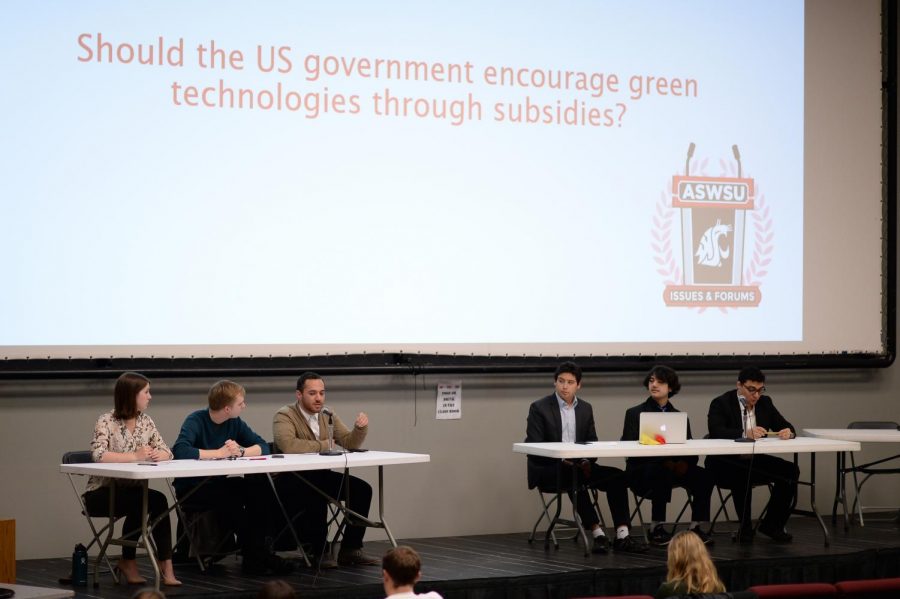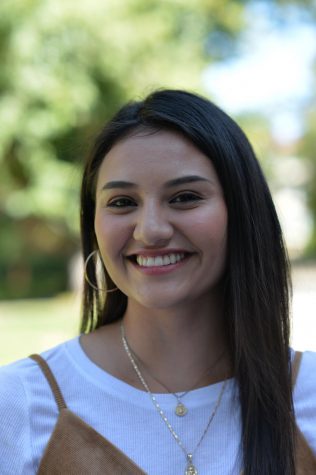Political student groups debate economics, foreign policy
Young Democrats at WSU, Young Americans for Liberty discuss U.S. foreign policy
OLIVER MCKENNA | THE DAILY EVERGREEN
Members of the Young Democrats at WSU, left, and Young Americans for Liberty discuss various topics such as climate change and green technology during their debate.
April 10, 2019
The ASWSU Issues and Forums Committee hosted a debate where members from Young Democrats at WSU and Young Americans for Liberty discussed climate change, election reform and U.S. foreign policy in Iraq, Syria and Venezuela.
A moderator asked if the U.S. government should encourage green technology through subsidies.
Ryan Hoffman, a member of Young Americans for Liberty, said subsidies ruin the incentive for innovation and a free-market would be more effective.
Jelani Christopher, a member of Young Democrats at WSU, disagreed and said subsidies would help corporations by providing them with an incentive to shift to renewable sources of energy.
Hoffman rebutted Christopher’s statement and said that companies are not changing their sources of power on their own because oil is cheap and easier to use in the current system.
The moderator asked if the U.S. should eliminate the Electoral College as a whole.
Wyatt Wallis, member of Young Americans for Liberty, said if the Electoral College was eliminated it would leave certain individuals voiceless. The popular vote generally benefits one party over the other.
Wallis said the media needs to stop focusing on a two-party system and allow other parties into the conversation.
Bailey McCoy, a member of Young Democrats at WSU, said a party-list voting system, which would eliminate two-party politics and spotlight other parties, would be the most effective.
The groups also discussed if the U.S. should intervene in Venezuela.
Jonah Ryan, a member of Young Americans for Liberty, said diplomatic intervention is as far as U.S. should go. He added that it is not necessary for U.S. to intervene when it is a civil issue.
Jacob Woodbury, vice president of the Young Democrats at WSU, said he disagreed with Ryan.
Woodbury said there should be a humanitarian and economic intervention to address the lack of citizen’s access to food and water. A good approach would is to convince allies to stop supporting Venezuela’s Nicolas Maduro and implement a democratically elected government.
Ryan agreed that humanitarian support is necessary, but said it is not the government’s job to do so, as there are other organizations doing that already.
Another issue discussed was how the U.S. should handle the destabilization in the Middle East around Syria.
Woodbury said a Kurdish state should be established.
Ryan said he agreed with the establishment of a Kurdish state in the region, but said that any further involvement needs to end.
The Syrian conflict is ongoing, but it is not a U.S. issue, he said.
Woodbury said he disagreed with Ryan’s statement on how further involvement should come to an end in Syria.
He said the U.S. has avoided its duty to accept refugees from the Middle East including Syria not because of a security issue, but because of ideological opposition.
Ryan said refugees cannot be vetted or confirmed whether they are criminals or not.
With the current immigration crisis in the country, accepting refugees would only add to the problem, Ryan said.
Woodbury rebutted Ryan and said to be considered a refugee and be admitted to the U.S., they need to interact with 17 agencies including UN and U.S. agencies.
“They really contribute to the fabric of our nation,” Woodbury said. “They don’t commit crimes, they are not terrorists [and] they bring vibrancy to our democracy.”
Ryan said he does not want to demonize refugees and make them seem like a scourge, but that there is no capacity or responsibility for the U.S. to take them in.
The article has been updated to correct McCoy’s statement regarding a party-list voting system.










